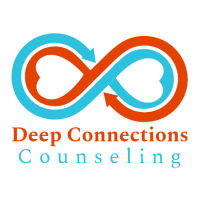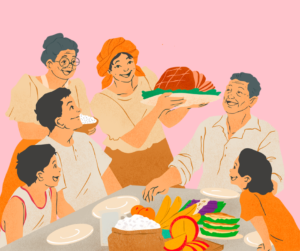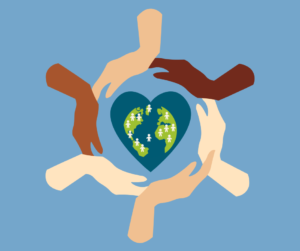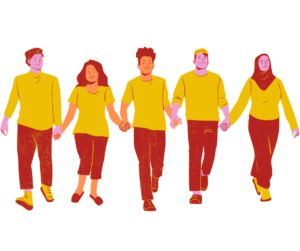Do you struggle to balance student life with a healthy relationship in college? Do you want to commit to your relationship, to your partner, and the future of both of you together? Learn how counseling can help you navigate this phase and keep your love life nourished.
A 2012 National College Health Assessment pointed out that approximately 35% of Georgetown University students had faced relationship difficulties within the previous 12 months. Additionally, just over 10% of the undergraduate population felt that relationship difficulties had negatively affected their academic performances.
This isn’t limited to Georgetown, either. Just like older adults, many North Carolina college students feel like the stresses of everyday life are magnified when they’re going through relationship strife. It impacts their friendships, their education, and sometimes even their day-to-day functioning.
One way to work through this strife and ease some of this stress is to try college student relationship counseling. Many people view couples counseling as something that’s just for married people, but that is a very narrow view. Any committed relationship can benefit from couples counseling — and assuming you and your partner don’t qualify because you’re in college is minimizing what you have together.
In this blog post, we will discuss why fights with your partner can be so stressful, and how you can build a healthy relationship in college through counseling.
Why Do Fights with Your Partner Hurt So Deeply?
You care for your significant other. You wouldn’t be in a relationship with them if you didn’t. And you wouldn’t be reading this if you didn’t!
This is because you’ve built what psychologists call an attachment bond with your partner. You see your relationship as security in a world that may not always feel very secure.
That’s why the problems you face in your relationship can be stressful — or even frightening. Certain relationship events — such as abandonment, betrayals, or perceived threats in general — threaten your sense of security in the world. And threats to your security, whether real or imaginary, activate your primal fight-or-flight response. Unfortunately, in relationships, this response only serves to deepen the wound.
This is where college student relationship counseling can play an important role. Our couples therapists are trained and experienced in assisting couples to get to the root of conflicts and help them maintain a healthy dialogue necessary for a thriving and healthy relationship in college.
Relationship conflicts are not to be avoided — they can’t be. But by getting to the root of conflicts, the frequency of conflict can be decreased. Additionally, one of the main goals of a couples therapist is to work on conflict management skills. This will improve your ability to accept and grow from conflicts, rather than allowing them to trip your fight-or-flight response.
How to Have a Healthy Relationship in College?
Healing from traumatic or extremely negative events can be a sensitive issue. You want to work through the emotions you both feel. But you’re hurt. Your relationship might be damaged and feel weak. Naturally, you don’t want to do anything to further damage your bond. Oftentimes, it can feel like you’re both walking on eggshells.
But relationship problems aren’t something you can ignore and hope time will heal. They need persistent care and attention. This is where the experience and expertise of a trained relationship therapist can be crucial. They understand how to guide you through this process and show you how to properly heal from relational damage.
Here at Deep Connections Counseling, our therapist Cynthia Gaskins specializes in college student relationship counseling. They are experienced in dealing with the kinds of issues that college couples typically go through, and they know how to help you work through them.
Healing From Attachment Injury with Emotionally Focused Therapy
It is incredibly important to understand that damage to a relationship is not caused by the specific argument or conflict itself. The damage doesn’t even come from the subject of the conflict. Rather, it is the attack on your security within your relationship and yourself that hurts and lasts.
In other words, it’s not important to focus on what happened. In fact, this might actually be detrimental to your relationship. Instead, the focus needs to be on the emotions that come from what happened.
Emotionally-focused therapy techniques (EFT) help couples gain a better perspective on how their relationship functions. EFT is a form of psychotherapy. It helps to identify fight-or-flight emotional interactions and replace them with growth-minded emotional responses to generate a positive change in your relationship dynamics. Its main goal is to repair relational and intimate bonds.
Response awareness and emotional acknowledgment are key to emotionally focused therapy techniques. Ultimately, you can learn to let go of harmful responses to foster a healthier, growth-focused relationship mindset.
Just Because You’re In College Doesn’t Mean Your Relationship Isn’t Important
We touched on this briefly above, but relationship therapy is often portrayed inaccurately in the media. Our society has been taught to view it as a last-ditch effort made by an older married couple to save their relationship.
Wrong.
Relationship therapy is for relationships. Period. The effectiveness of relationship therapy does not depend on the age of the individuals. Nor does it matter how long the relationship has existed.
The word “relationship” also doesn’t define the status of a relationship. So whether you’re married, engaged, dating, or “undefined,” it doesn’t affect whether or not couples therapy will work.
Regardless of your age, you deserve to love and feel loved — as does your partner. If you want a strong relationship together, it takes work. But not just work — it takes the right work. And sometimes it can be hard to navigate your way through this without the guidance of a trained professional.
Especially when you have a thousand other things taking up your time and attention. Classes. Clubs. Internships. Financial worries. Friends.
Next Steps
But we are here to help. Cynthia Gaskins knows the struggles and stresses of college relationships and the importance they hold in the everyday lives of students all around the country.
College students can benefit from relationship counseling too! Contact us to schedule a 15-minute free consultation to get started on this journey of healing within your relationship and yourself. Schedule your free consultation!

Kinga Gudor, PhD
Kinga is a Licensed Clinical Social Worker (LCSW) with more than 15 years of experience. She specializes in couples therapy and working with individuals from a multicultural background.











